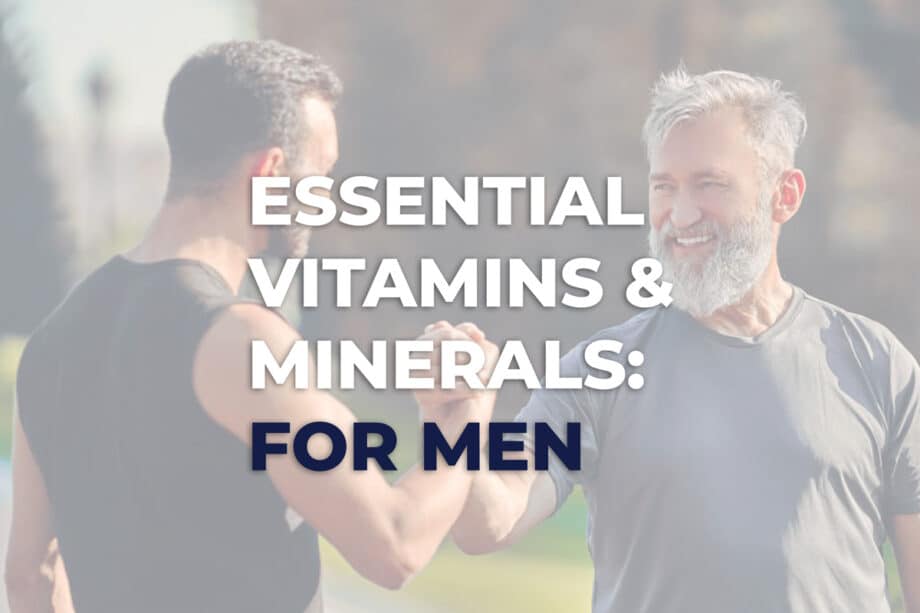Our bodies serve us well as we pursue our dreams and carry out our day to day. Last month we focused on the female body; this month we will focus on the male body. Our body and brain allow us to fill essential roles—as athletes, scientists, teachers, artists, fathers, sons, and friends. To support our sustained involvement in these essential roles, must to take care of our bodies. Consuming vitamins and minerals intentionally—providing our body with the nutrients it needs—will foster our continued involvement in these realms. Today we will discuss five essential vitamins and minerals that support healthy male bodies:
- Vitamin B12
- Vitamin D
- Magnesium
- Selenium
- Zinc
These five minerals play essential roles in male health. However, the human body requires more than these alone. So, before we dive into these five essential nutrients, let us outline the importance of vitamins and minerals as a whole. Below we detail nutrient definitions and list the vitamins and minerals that sustain all humans.
What Are Vitamins & Minerals?
You have likely heard this saying: food is fuel. Commonplace, but true! Food is—literally—fuel. Primarily because food supplies our bodies with the nutrients it needs to function. We break down nutrients into two categories: vitamins and minerals. Humans require the following vitamins and minerals in their diets:
- Vitamins: A, C, D, E, K, and the B family
- Minerals: calcium, chloride, cobalt, copper, fluoride, iodine, iron, magnesium, manganese, phosphorous, potassium, selenium, sodium, sulfur, and zinc
Do not let this list of essential nutrients overwhelm you. The average, healthy individual consumes sufficient amounts of these vitamins and minerals in well-rounded whole food diets. But, if you struggle to consume essential nutrients through your food alone, consider supplementation. Supplementation exists to close nutrient gaps
Vitamin B12
This vitamin supports the body in its production of red blood cells. Developing red blood cells—erythroblasts— require it in their proliferation. Vitamin B12 also functions as a cofactor in cellular DNA and the central nervous system. In the central nervous system, it supports the development, myelination, and functions of nerve cells. Vitamin B12 provides the methyl groups required for protein synthesis and catalyzes the synthesis reactions.
Vitamin B12 becomes increasingly important in active males. It supports sustained energy levels, allowing the male body to keep up with all of its physical endeavors—from walking, to running, to hiking, to canyoneering.
Daily Recommended Value: Vitamin B12
The National Institute of Health offers the following recommended intakes for average, healthy adults.
- Adult Males: 2.4 micrograms/day
You can consume this mineral through your diet or through supplementation. Do whatever best supports you and your individual nutrient sufficiency.
Vitamin D
This vitamin supports the body through its involvement in calcium absorption. Calcium is required for continued bone health and density. Vitamin D works in conjunction with calcium to maintain bone density. It also possesses protective properties that support immune health, muscle health, and brain health.
Vitamin D becomes increasingly important in males. This mineral supports regulated testosterone levels in the male body i.e., the steroid hormone involved in the development of secondary male characteristics. Vitamin D supports sustained bone health and muscle health in aging males.
Daily Recommended Intake: Vitamin D
The National Institute of Health offers the following recommended intakes for average, healthy adults.
- Adult Males: 15 micrograms/day
- Senior Males: 20 micrograms/day
You can consume this mineral through your diet or through supplementation. Do whatever best supports you and your individual nutrient sufficiency.
Magnesium
Magnesium is a major mineral that functions as a cofactor in enzyme reactions. Magnesium supports over three hundred enzyme systems throughout the body. It functions as a regulatory cofactor in the skeletal, cardiovascular, and nervous systems.
Magnesium becomes increasingly important in males. This mineral supports sufficient levels of free testosterone in the male body i.e., the steroid hormone involved in the development of secondary male characteristics. Magnesium also supports senior males through sustained energy levels.
Daily Recommended Intake: Magnesium
The National Institute of Health offers the following recommended intakes for average, healthy adults.
- Adult Males: 1000 milligrams/day
- Senior Males: 1200 milligrams/day
You can consume this mineral through your diet or through supplementation. Do whatever best supports you and your individual nutrient sufficiency.
Selenium
Selenium is an essential trace mineral that supports healthy immune responses, DNA synthesis and thyroid hormone metabolization. It further supports the body through its involvement in the composition and synthesis of essential selenoproteins.
Selenium becomes increasingly important in aging males. According to the National Institute of Health, adequate selenium levels support prostate health through lowered levels of prostate-specific antigens. The prostate supports male reproduction through the production of semen. So, we want to support its health and longevity.
Daily Recommended Intake: Selenium
The National Institute of Health offers the following recommended intakes for average, healthy adults.
- Adult Males: 55 micrograms/day
You can consume this mineral through your diet or through supplementation. Do whatever best supports you and your individual nutrient sufficiency.
Zinc
Zinc is an essential trace mineral that resides in all human cells—found in the nucleus, nucleolus and chromosomes. It as a cofactor and coenzyme in enzyme reactions, supporting over 300 enzyme systems throughout the body.
This mineral becomes increasingly important in males when they reach reproductive age. Zinc supports increased sperm density and motility in males, subsequently increasing the likelihood of conception and pregnancy.
Daily Recommended Values: Zinc
The National Institute of Health offers the following recommended intakes for average, healthy adults.
- Adult Males: 11 milligrams/day
Optimal daily intakes vary. If you have concerns about your zinc intake as it relates to your individual health, please reach out to your healthcare provider! Do whatever best supports you and your individual nutrient sufficiency.
Conclusion
The human body functions on vitamins and minerals. Whether you consume these through food or supplements, consume them intentionally.
If you have questions or concerns about your individual vitamin and mineral needs, please reach out to your healthcare provider!

